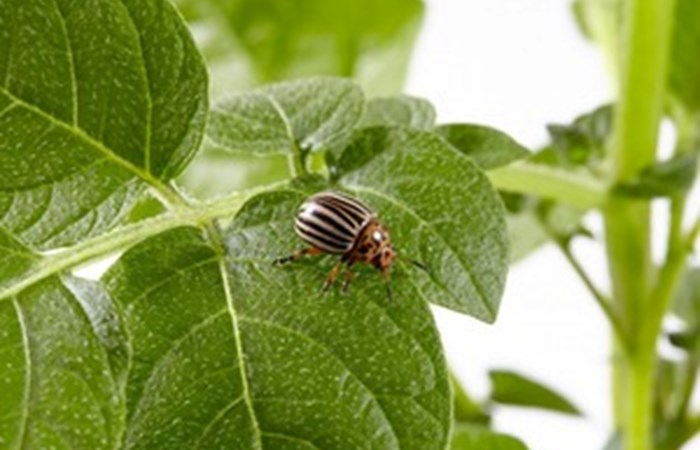Animal Plant Health Agency

A single adult beetle identified in Hampshire was today (Friday 14 July) confirmed by Defra and the Animal and Plant Health Agency (APHA) as Colorado potato beetle (Leptinotarsa decemlineata).
Confirmation was made following laboratory diagnosis of samples taken by APHAs Plant Health and Seeds Inspectorate. This follows an unrelated outbreak of the beetle in the Kent area earlier this week.
The confirmation comes following a report made by member of the public in Hampshire. APHA removed the beetle and will be conducting surveys in gardens, potato crops and land around the finding to ensure there are no other Colorado beetles present.
If not eradicated, Colorado potato beetles are a significant threat to potato crops. The adult beetles and larvae feed on the foliage of potato and other plants in the nightshade family and can completely strip them of their leaves if they are left uncontrolled. However, they are not a threat to human or animal health.
UK Chief Plant Health Officer Nicola Spence said:
Following a report by a vigilant member of the public, our experts have identified the presence of single adult Colorado beetle in Hampshire. The beetle was swiftly removed by the Plant Health and Seeds Inspectorate and there is no evidence to suggest this finding is connected to the outbreak in Kent.
Whilst this pest does not pose a threat to human health, we encourage all growers, farmers, processors and the public to remain vigilant and report any sightings.
The beetle is not endemic to the UK and is currently regulated as a Great Britain quarantine pest, with import and movement restrictions in place for susceptible host material. APHA is obligated to act upon the current findings and eradicate this pest to support our efforts to maintain this status. Statutory Notices will be issued to ensure the containment and eradication of this pest is undertaken.
Farmers and growers in particular are being encouraged to remain vigilant for signs of the pest. The beetle is bright yellow or orange with black stripes and is usually between 8.5-11.5mm in length and 3mm in width. Its larvae are a reddish brown in colour, round and globular, and up to 15mm in length.
Although distinctive in appearance, there are several beetles that are frequently mistaken for them. The Colorado potato beetle plant pest factsheet provides more information about the beetles life cycle and provides information on how to differentiate it from some of our native and introduced species.
The beetles are occasionally imported into the UK from continental Europe as hitchhikers on non-host plant material, such as leafy vegetables, salad leaves, fresh herbs and grain and are reported to the UK Plant Health Service who act on the findings. In the past 70 years, there have been two outbreaks of Colorado potato beetles in the UK, one in 1976 and one in 1977. Both outbreaks were eradicated shortly after detection.
ENDS
Notes to editors:
- Colorado potato beetle was first recorded in 1811 in the USA. The beetle has since spread across the USA, and moved into Canada, Central America, Europe and Asia.
- It first established in Europe in Bordeaux, France, in 1921, and is now present in most European countries. However, it has yet to establish in the UK.
- Further information can be found in the UK Pest specific Plant health response plan for Colorado beetle.
- Please immediately report any suspected findings of the Colorado potato beetle or its larvae to the Animal and Plant Health Agency. All suspected findings, whether in a commercial, environmental, or domestic setting, must be reported to the APHA under the Plant Health Regulation. For England and Wales, Tel: 0300 1000 313 Email: planthealth.inf
